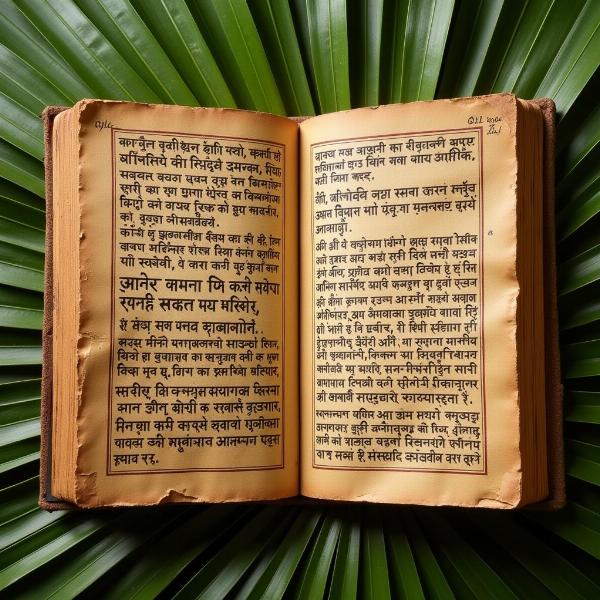Understanding the meaning of “history” in Hindi goes beyond a simple translation. It delves into the cultural nuances and perspectives that shape how Indians perceive the past. While the most common translation is “इतिहास” (itihaas), the word carries a weight of tradition, storytelling, and ancestral reverence. This exploration will uncover the various dimensions of “history” in Hindi, from its linguistic roots to its cultural significance.
इतिहास (Itihaas): More Than Just a Word
The Hindi word “इतिहास” (itihaas) originates from Sanskrit, meaning “it thus happened.” This etymology emphasizes the factual nature of history, highlighting its basis in real events. However, the concept of history in India is not solely confined to dry facts and dates. It intertwines with mythology, philosophy, and social values, creating a rich tapestry of narratives that shape individual and collective identities. Think of the epics like the Ramayana and Mahabharata. While considered religious texts, they also serve as historical narratives, offering insights into ancient Indian society, beliefs, and values. What is the meaning of history then? It’s a blend of documented truth and cultural memory.
 Meaning of History in Hindi: Ancient Texts
Meaning of History in Hindi: Ancient Texts
The Cultural Significance of History in Hindi
History in Hindi is not merely an academic pursuit. It’s a living force that shapes the present and guides the future. Respect for elders, adherence to traditions, and the importance of lineage are deeply rooted in the Indian psyche, reflecting a profound connection to the past. This reverence for history translates into various cultural practices, from storytelling within families to grand celebrations of historical events. For example, festivals like Diwali and Holi are not just religious occasions; they commemorate historical narratives that reinforce cultural values and strengthen community bonds. Do you see how history permeates everyday life in India?
Different Facets of “History” in Hindi
While “इतिहास” (itihaas) is the most common term, other words and phrases in Hindi capture different aspects of history. “पुराण” (puraan) refers to ancient lore and myths, often interwoven with historical accounts. “कथा” (katha) signifies a story or narrative, which can be historical or fictional. “वृत्तांत” (vrittaant) denotes an account or report, often used in a historical context. These diverse terms reflect the multi-faceted nature of history in Hindi, encompassing everything from documented facts to oral traditions and cultural memories.
History and Identity
History plays a crucial role in shaping individual and collective identities in India. From the stories we hear as children to the historical figures we admire, the past profoundly influences our understanding of who we are. This connection to history fosters a sense of belonging and continuity, linking us to a larger narrative that transcends individual lives. Understanding the meaning of history in Hindi is therefore essential to understanding Indian identity itself.
How Does Meaning-Hindi.in Help with Historical Texts?
Understanding historical texts requires linguistic precision and cultural sensitivity. Meaning-Hindi.in offers expert translation services that bridge the gap between languages and cultures. Our team of skilled linguists, with a deep understanding of Hindi and its nuances, can accurately translate historical documents, literature, and research materials, ensuring that the meaning and context are preserved. Whether you need to translate ancient scriptures, historical records, or academic papers, Meaning-Hindi.in provides reliable and high-quality translation services tailored to your specific needs.
Conclusion
The meaning of “history” in Hindi extends beyond a simple definition. It encompasses a rich tapestry of narratives, traditions, and cultural values that shape Indian identity. Understanding this deeper meaning provides valuable insights into the Indian worldview and the profound connection between the past, present, and future. “इतिहास” (itihaas) is more than just a word; it’s a living testament to the enduring power of the past.
FAQ
- What is the most common Hindi word for “history”? The most common word is “इतिहास” (itihaas).
- Does “history” in Hindi include mythology? Yes, history in Hindi often intertwines with mythology and folklore.
- What are some other Hindi words related to “history”? Words like “पुराण” (puraan), “कथा” (katha), and “वृत्तांत” (vrittaant) are also related to different aspects of history.
- Why is history important in Indian culture? History plays a crucial role in shaping individual and collective identities in India, fostering a sense of belonging and continuity.
- How can Meaning-Hindi.in assist with historical text translation? Meaning-Hindi.in provides professional translation services for historical documents, ensuring accuracy and cultural sensitivity.
- Is “itihaas” derived from Sanskrit? Yes, “itihaas” originates from Sanskrit.
- How does the etymology of “itihaas” inform its meaning? The Sanskrit origin, meaning “it thus happened”, emphasizes the factual basis of history.
Meaning-Hindi.in: Your Trusted Partner for Hindi Translation
Meaning-Hindi.in offers a wide range of professional translation services, specializing in business, legal, technical, website localization, educational, and specialized translations. We understand the nuances of Hindi and its cultural significance, ensuring accurate and culturally sensitive translations. For all your Hindi translation needs, contact us at [email protected] or call us at +91 11-4502-7584. Meaning-Hindi.in is your trusted partner for bridging the language gap and connecting cultures.